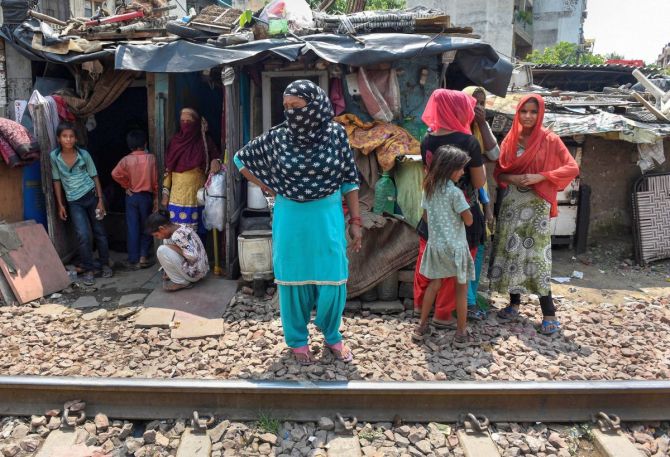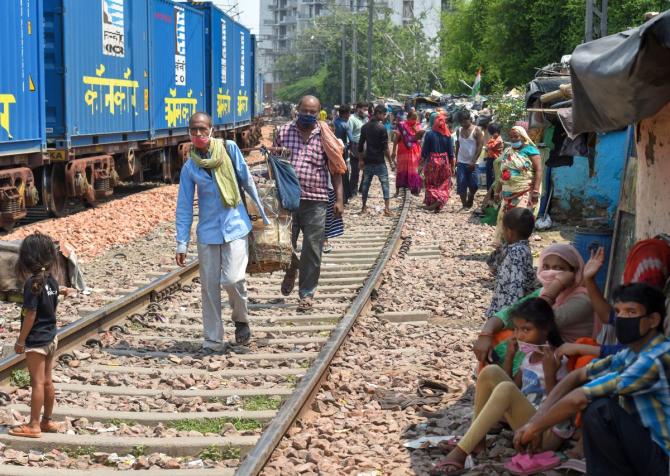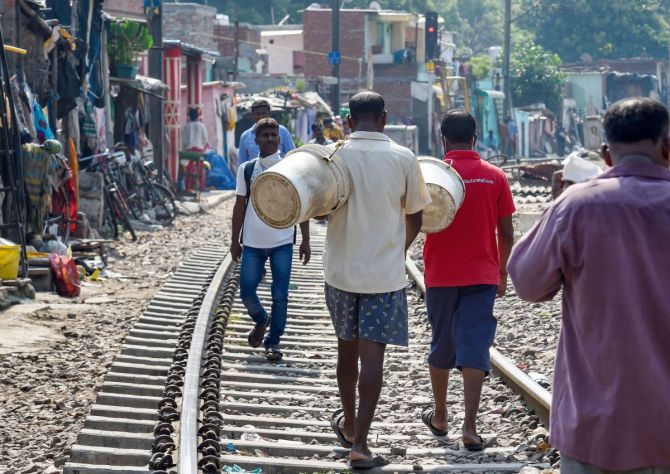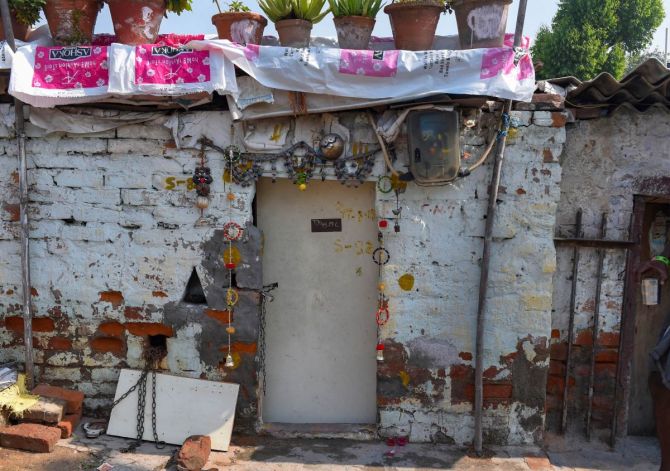'Why do politicians ask for votes if they cannot rehabilitate us? Where do we go -- to the footpath?'

The COVID-19 pandemic took away her family's livelihood and now 48-year-old Veeramma fears she will lose her roof in the wake of the Supreme Court ordering the removal of 48,000 slum dwellings along railway tracks in Delhi.
"My husband was born here. My son was born here. My in-laws breathed their last in this house. This is all we have," said Veeramma as she sat on crushed stones outside her home at a slum cluster alongside a railway track near Jal Vihar in Lajpat Nagar.
The 48-year-old, who works as a domestic help, said her employers haven't called her back to work yet.
"My husband cannot move. My son is a daily wager, he doesn't have much work, too. We don't have enough ration to feed the family for another week," said Veeramma looking at her two-year-old granddaughter, a third generation to be born in the slum cluster.
"We don't have the money for my granddaughter's milk. Even if we beg, we won't get anything. The times were never so bad," she said.
The Supreme Court had on August 31 ordered the removal of 48,000 slum dwellings along railway tracks in Delhi within three months.
As per rough estimates, there are around 2,40,000 people living in slums in Naraina Vihar, Azadpur, Vihar, Shakur Basti, Mayapuri, Sriniwaspuri, Anand Parbat and Okhla among others.

The Northern Railways had submitted a report to the apex court which said that mushrooming of slums along railway tracks is acting as hindrance towards keeping them clean.
Panchavarna, 55, said her family had moved to Delhi from Chennai.
"We know the land belongs to the government, but where will we go? Who will take our responsibility?" she asked.
Elumalai, 35, reminded the government's promise of "jahan jhuggi wahin makan" made before the elections.
"We do not say we won't accept the court's order. This land belongs to the railways and they will take it one day, but where will we go? No one cares for us," Elumalai, whose father came to Delhi from Chennai in 1978, said.
Interestingly, each household in the slum has got electricity connection, Aadhaar card, voter id, and ration card.
The Aam Aadmi Party government had built community toilets for the slum dwellers last year, so that no one defecates in the open or on the tracks, said 45-year-old Shankar Sarangam, a driver who did not get a salary for three months during the COVID-19-induced lockdown.
"The salary has been reduced by half. I have a family to feed. We were thankful to god that we have a roof over our head," he said.
"Now the jhuggi will be gone, too. The railways should have at least considered the timing of the move. The impact of the pandemic will linger on for another three years," Sarangam said.

In another slum along the railway tracks in Sriniwaspuri, Ramnadhar Mandal, 40, asks, “Why do politicians ask for votes if they cannot rehabilitate us? Where do we go -- to the footpath?”
Mandal, who hails from Bihar's Katihar district, has two baby girls who are learning to walk.
"Think of these children. We will have to spend nights in the open, in rains and winters,” he said, clasping his hands together, as if making a request to the government.
Gunodhar Mandal, 60, who came to Delhi from West Bengal's Malda district 25 years ago is not very hopeful of a “proper rehabilitation”.
“I am afraid we will be asked to leave the city and go back to the village. We have nothing left there,” he said.
The matter has taken a political tone with the Aam Aadmi Party targeting the Bharatiya Janata Party for eviction notices being issued by the railways.
AAP spokesperson and MLA Raghav Chadha on Friday tore eviction notices sent to the residents and said no one could raze their shanties "till Kejriwal is alive".
The Delhi BJP has alleged that despite being in power for over five years, the AAP has done little to rehabilitate people living in slums in the city.
The Arvind Kejriwal government says the railways cannot demolish the slum clusters along the train tracks without providing alternative accommodation to its inhabitants in accordance with the provisions of Delhi Slum and JJ Rehabilitation and Relocation Policy, 2015.

On its part, railways said it was working in line with the orders of the Supreme Court, but refused to elaborate further on the issue.
In a letter to the railways on Thursday, the Delhi Urban Shelter Improvement Board, headed by chief minister Kejriwal, said that according to the 2015 policy, the rehabilitation work has to be undertaken by the agency which owns the encroached land.
However, the DUSIB also said it can undertake rehabilitation work but the railways will have to pay for the cost of land and construction as well as relocation charges ranging from Rs 7.55 lakh to Rs 11.30 lakh per flat.
The agency also provided a list of over 29,000 completed housing units and another 16,600 under construction ones available with the Delhi government.
These houses were constructed in different parts of the city including Narela, Bawana, Baprola, Sultanpuri and other places under Jawaharlal Nehru National Urban Renewal Mission between 2007 and 2019.
The DUSIB has said the 29,257 completed flats will be ready to move in by March-April 2021, while the under construction 16600 flats at Tikri and Pooth Khurd will be ready by December 2021.











 © 2025
© 2025